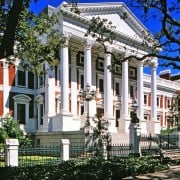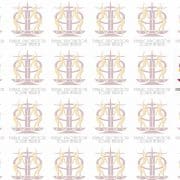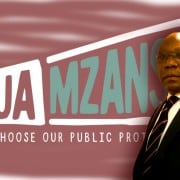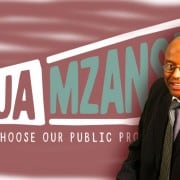|
Getting your Trinity Audio player ready...
|
Our new three-part Bua Mzansi series looks at the careers of South Africa’s three public protectors to date. In part three, we focus on Thuli Madonsela, who, with her team, has raised the image and reputation of the institution to unprecedented heights. Parts one and two looked at Selby Baqwa and Lawrence Mushwana respectively.
Public Protector Thuli Madonsela ends her term in October after seven years as the head of the institution. Best known for her prominent corruption investigations, which have led to major court cases and the dismissal of high-profile politicians, among the general public Madonsela is certainly the most celebrated public protector.
Her legacy will, no doubt, be prominently associated with her report, Secure in Comfort, which found that President Jacob Zuma had unduly benefited from upgrades to his Nklandla residence that were not security-related. Her findings prompted opposition parties to adopt the slogan “pay back the money”, arguably one of the most popular aphorisms in South African politics during Zuma’s second term. Long after she leaves office Madonsela will be patently linked with the epic saga of Nkandlagate.
Following two years of criticism and denial that the president was bound by the report or was required to pay back anything, his lawyers conceded during a Constitutional Court hearing that Zuma was bound by the findings of the Public Protector. This was a vindication for Madonsela, who has been subject to fierce attacks by members of the ruling party for her report and in one extreme instance was even accused of being a CIA spy.
She stood firm, however, and on 31 March 2016 the highest court in the land in its judgment found that the rulings of the Public Protector were binding and could only be set aside upon judicial review. The court declared that the actions taken by the president and the National Assembly were inconsistent with the Constitution and invalid, and ordered the National Treasury to quantify the amount the president must personally repay to the fiscus as a result of non-security related features at his homestead in Nkandla. It was a victory for the Office of the Public Protector (OPP) and the country’s democracy.
There is a great symbolic and real-world importance in a Public Protector holding the president – the country’s highest ranking politician – to account. The ruling by the Constitutional Court was a resounding vindication of the jurisdiction and centrality of the Public Protector in protecting our most fundamental constitutional values. The court characterised the Public Protector as an independent and essential fighter against public maladministration.
How the mighty have fallen
The Public Protector has released reports on investigations that have played a crucial role in several cabinet ministers and one police commissioner losing their positions. Bheki Cele was dismissed as national police commissioner in 2012 following a report by the Public Protector that found that he was involved in improper conduct and maladministration when the police entered into a R500-million lease for a building in Pretoria. Gwen Mahlangu-Nkabinde, the minister of public works at the time, was also accused of maladministration and lost her position in a 2011 Cabinet reshuffle.
Former minister of co-operative government and traditional affairs Sicelo Shiceka faced numerous allegations of misusing taxpayers’ money. These included the use of public funds to pay for luxury hotel stays, limousines and first-class plane tickets for personal flights. The Parliamentary Ethics Committee tasked the Public Protector with investigating the allegations. The Public Protector’s report found that Shiceka had violated the Constitution and Executive Ethics Code by spending more than R1-million on travel expenses for himself, staff and friends. He was dismissed from the Cabinet in October 2011.
In a country where lack of accountability is so often a problem, it is remarkable that the Public Protector has had this kind of impact. While corruption and maladministration remain serious problems, these actions by the Public Protector have been important in stemming the tide.
Smoke screens
But it is not just politicians who have been called to account by the OPP during Madonsela’s tenure.
The Office has recommended action against the controversial chief operating officer of the public broadcaster SABC, Hlaudi Motsoeneng, for exorbitant salary increases and lying about his matric certificate. The matter is currently before the courts.
In another well-known report from her institution, Madonsela found that former Passenger Rail Agency of South Africa CEO Lucky Montana should be held personally liable for systematic failures to comply with supply chain management policy, and inappropriate tender awards. Montana was fired by the agency the month before the report was published.
In a significant case involving a high-profile person identified by the Financial Times as a friend of Madonsela, the former head of the Independent Electoral Commission, Pansy Tlakula, resigned. She had been found responsible for gross maladministration following irregular processes in the procurement of the commission’s leasing of new headquarters. The Financial Times quoted Madonsela as saying that the decision was a tough one to take as Tlakula was someone she regarded highly. The matter showed that when it came to this public protector, personal relationships would not stop improper actions from being challenged and corrected.
Raising the profile and credibility of the OPP
In its feature on Madonsela in December 2015, the Financial Times magazine stated: “Before Madonsela’s appointment, the public protector was a low-key office that many South Africans were unaware of. Now it is one of the most high-profile in the country.”
In a 2013 survey conducted by Freedom House, Madonsela was widely praised for her work in protecting South Africa’s democracy. The survey suggested that the Public Protector was well known and was seen as a powerful force against corruption and as contributing to building democracy. The Public Protector was also acknowledged for engaging directly with communities.
The impact Madonsela has had on the reputation of the institution of the Public Protector is important because of the powerful potential the OPP has to combat ills such as corruption, maladministration and the wasting of taxpayers’ money. The next public protector will need to be able to build on this legacy. Madonsela’s fearless approach to high-profile and sensitive investigations will hopefully embolden future public protectors to act without fear or favour.
In 2014, Time magazine ranked Madonsela among the top 100 most influential people in the world under the category of leaders, praising her as “an inspirational example of what African public officers need to be”.
But this high profile has a flipside. ANC deputy secretary-general Jessie Duarte criticised Madonsela for being “populist” following the release of her Nkandla report. This view is shared by some citizens, who feel the OPP has become too centred on the person of the public protector, that there is not enough recognition that she is part of a team that does the investigations and uncovers the findings presented to the public.
“She is a leader of an important office and that makes her important, but she has people who work for her and with her and they don’t get as much praise. She has become a celebrity alone,” said Martin Sithole, a Johannesburg resident.
Maurine De Silva, from Roodepoort in Greater Johannesburg, agreed. “I’m proud of her as a woman myself and as a South African for the great work she has done,” she said, “but I worry that she has become this super celebrity and when she steps down she will take that status with her and the Office itself will be left without the same recognition. I feel while she was clearly a great head of the Office there should be more recognition and hailing of the Office and its staff too. When she goes the Office will still be there with its people and they need to be noticed because she couldn’t have done it without them. That’s the truth.”
However, Madonsela herself praises her team highly and publicly, and at the release of reports or in media briefings never fails to credit them for their efforts and support.
Woman power
As the first female to occupy the position of public protector, there is a particular significance to the role Madonsela has been able to play. She has set a strong example in an often patriarchal society that women can be powerful and effective leaders. In a 2013 interview, she remarked that “the firmness with which I make decisions was not expected from a woman”. She may well have helped to break some important barriers for future female leaders.








